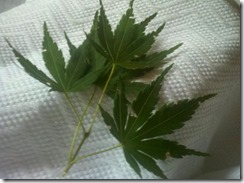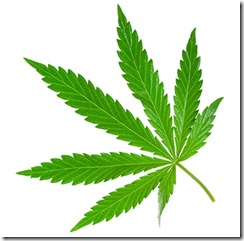New York Senate Committee Passes Medical Marijuana
Minnesota Medical Marijuana Bill Passes in Senate
Uruguay Unveils Rules for Legal Cannabis Markets
Military Veteran Farmers to Plant Historic Industrial Hemp Crop in Kentucky

MOUNT VERNON, KY — Vote Hemp, the national single-issue advocacy group dedicated to re-commercializing industrial hemp, and Kentucky non-profit Growing Warriors, have partnered to organize a planting of industrial hemp in Mount Vernon, KY on May 16, 2014, as part of the nationwide grassroots education effort Hemp History Week .
The certified industrial hemp seed provided by the Kentucky Department of Agriculture will be grown as part of a research and development program in conjunction with the Kentucky State University, and marks an historic moment in the Bluegrass State after decades of federal prohibition of industrial hemp.
Grown for its versatile fiber and oilseed, which can be used to make rope, paper, building materials, bio-fuels, cosmetics, healthy food, body care products, textiles, plastic composites, and much more, hemp was once a paramount crop of Kentucky cultivated in the state as recently as the 1950′s, but was permanently banned in 1970 as a Schedule 1 drug under the Controlled Substances Act.
The return of hemp to Kentucky’s farmland and mills is lauded by many political, agriculture and industry leaders in the state and beyond who view the burgeoning industrial hemp market as a step toward job growth and sustained economic stability in the Commonwealth.
The hemp will be sown by war veterans who have partnered with Growing Warriors to learn agriculture and farming skills and work toward creating local community food systems.
“The farming and production of industrial hemp in America just makes sense,” says Mike Lewis, Executive Director of Growing Warriors. “The important thing to note is that a hemp industry must be built from the ground up, and if done properly and responsibly it will restore some vibrancy to our communities. Fighting alongside my fellow Veterans for this crop has already made me a wealthier man as I witnessed the grit and determination that built this country play out daily and now I will be afforded the opportunity to plant this historic crop with true patriots.”
“We took on this fight at the state legislature a year ago, and who would have ever dreamed we would change Kentucky law—change federal law—and have hemp in the ground today?” Agriculture Commissioner James Comer said. “This is an historic moment for Kentucky farmers, and my hope is that industrial hemp can again be a thriving industry that presents new opportunities in agriculture and manufacturing for years to come.”
“Kentucky is leading the country toward a revitalized, lucrative and sustainable hemp industry,” says Eric Steenstra, President of Vote Hemp. “Kentucky farmers, legislators and manufacturers have joined together to bring back hemp farming to the Kentucky landscape, knowing that hemp will bring job creation, among many other economic and environmental benefits.”
To date, thirty-three states have introduced pro-hemp legislation and twenty-two have passed pro-hemp legislation. Fourteen states (California, Colorado, Hawaii, Indiana, Kentucky, Maine, Montana, Nebraska, North Dakota, Oregon, Vermont, Washington and West Virginia) have defined industrial hemp as distinct and removed barriers to its production.
However, despite state authorization to grow hemp, farmers in those states risk raids by federal agents if they plant the crop outside the parameters of Section 7606 of the recent Farm Bill, due to failure of federal policy to distinguish oilseed and fiber varieties of Cannabis (i.e. industrial hemp) from psychoactive varieties (i.e. marihuana.)
In 2013, both the federal Senate and House introduced versions of the Industrial Hemp Farming Act, S. 359 and H.R. 525 respectively. So far in the 2014 legislative session, industrial hemp legislation has been introduced or carried over in Puerto Rico and twenty-five states: Alabama, Arizona, Colorado, Connecticut, Hawaii, Illinois (carried over from 2013), Indiana, Kentucky, Maryland, Michigan, Minnesota, Mississippi, Missouri, Nebraska, New Hampshire (carried over from 2013), New Jersey (carried over from 2013), New York, Oklahoma, South Carolina, South Dakota, Tennessee, Utah, Washington (two bills were carried over from 2013), West Virginia, and Wisconsin.
Farm Bill , Growing Warriors , hemp , hemp cultivation , hemp farming , industrial hemp , Industrial Hemp Farming Act , James Comer , Kentucky , Kentucky Department of Agriculture , Kentucky hemp , Kentucky State University , US HR 525 , US SB 359 , Vote Hemp
![]()
by Vote Hemp
Vote Hemp is a national, single-issue, non-profit organization dedicated to the acceptance of and a free market for low-THC industrial hemp and to changes in current law to allow U.S. farmers to once again grow this agricultural crop.
Washington State Cannabis Retail Lottery Complete
Minnesota Medical Marijuana Moves through Senate
Kentucky’s first industrial hemp crop in decades will start going into the ground next month
Comer: First hemp crop in decades set for planting
LOUISVILLE, Ky. (AP) — Kentucky’s first industrial hemp crop in decades will start going into the ground next month now that the pipeline for shipping seeds into the state is opening up to allow the experimental plantings, state Agriculture Commissioner James Comer said Tuesday.
Comer said he expects the first batches of hemp seeds to arrive in coming days at the state Agriculture Department at Frankfort.
“We’re rapidly approaching a crucial time for the seeds to be put in the ground,” he said by phone.
So far, eight pilot projects are planned statewide as part of a small-scale reintroduction to gauge the versatile crop’s potential in the marketplace and as a money maker for farmers. The first planting is scheduled for May 16 in Rockcastle County, said Comer’s chief of staff, Holly Harris VonLuehrte.
“Hopefully we can get enough seeds to have credible research data gathered by this fall,” Comer said. “And next year, hopefully we’ll have enough seeds to have several processors in the state and several farmers under contract growing it.”
Hemp production was banned decades ago when the federal government classified the crop as a controlled substance related to marijuana. Hemp and marijuana are the same species, Cannabis sativa. Hemp has a negligible amount of THC, the psychoactive compound that gives marijuana users a high.
The crop’s comeback gained a foothold with passage of the new federal farm bill. It allows state agriculture departments to designate hemp pilot projects for research in states that already allow the growing of hemp.
Kentucky lawmakers passed legislation last year that allowed hemp to be reintroduced, if the federal government allows its production.
Once the farm bill allowed the experimental plantings, the next challenge was getting hemp seed into the state.
Comer said Tuesday his staff has “gone through every level of federal bureaucracy you can go through to get those seeds in.”
U.S. Border Patrol officials have been cooperative as Comer’s office worked to develop a supply route to bring in hemp seeds, VonLuehrte said. The initial seeds are coming from Canada and Italy, Comer said.
State agriculture officials have helped match farmers with researchers for the pilot hemp projects. Some hemp grown will be sold for commercial uses after the fall harvest to help determine the crop’s marketability, VonLuehrte said. Some hemp will be grown purely for research, she said.
One pilot project in Fayette County will focus on hemp’s potential in medicine, she said. Gov. Steve Beshear recently signed into law a bill that allows doctors at two Kentucky research hospitals to prescribe cannabidiol to treat patients.
Several universities are participating in the hemp projects, also aimed at answering basic production questions for a crop that once thrived in Kentucky.
“It’s going to answer every question that a prospective farmer … would want to know,” Comer said. “What’s the optimum date to plant? Which variety of seeds grows best on which soil? What type of farm equipment does it take to harvest this hemp?”
Comer sees hemp as a way to boost Kentucky’s economy, especially in rural areas, through crop production, processing and manufacturing. Hemp was historically used for rope but has many other uses: clothing and mulch from the fiber; hemp milk and cooking oil from the seeds, and soap and lotions.
The next goal will be to win congressional approval to deregulate hemp, he said.
“We’re hopeful that after a year or two, that it can be deregulated and treated like any other agricultural crop,” Comer said.
In the next few days, the (HEMP) seeds will finally arrive to Kentucky
LOUISVILLE, Ky. (WDRB) — Kentucky Agriculture Commissioner James Comer says it’s been a long road to bring back industrial hemp.
Kentucky lawmakers passed a bill in 2013 to allow the reintroduction of industrial hemp if the federal government lifted its ban.
Then, a federal farm bill agreement allowed pilot growing programs. Comer says Kentucky helped lead the way.
“Here we are, we passed it in Kentucky. Now other states are saying ‘Yeah, we want to do that too’. Indiana’s following suit.
Tennessee’s followed suit passing legislation,” Comer said.
However, the big challenge has been getting the hemp seeds into the country, since it has been illegal to import them into the U.S.
The federal government banned hemp several decades ago when it classified the crop as a controlled substance related to marijuana.
“Even though legislation passed in the Farm Bill to legalize it, the customs agents and border patrol and all the different federal bureaucracies
didn’t know about that, so we’ve had to educate all the federal bureaucracies,”Comer said.
In the next few days, the seeds will finally arrive to Kentucky.
They’re coming in from Europe, Canada, and possibly even China. The seeds are first arriving to a port in Chicago.
Comer says six Kentucky universities will do pilot projects on industrial hemp, including the University of Louisville.
They are hoping the projects will answer many questions.
“Like what is the cost of production per acre, what is the yield per acre, what types of invasive species may come in and harm the crop,
what types of farm equipment can we harvest this crop with, which variety of seeds grow best in which types of soil,” Comer said.
Comer says they must also determine how marketable some of the hemp will be.


